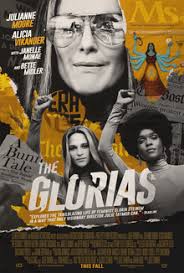
THE GLORIAS
US, 2020, 147 minutes, Colour.
Julianne Moore, Alicia Vikander, Ryan Keira Armstrong, Lulu Wilson, Gloria Steinem, Timothy Hutton, Enid Graham, Bette Midler, Janelle Monae.
Directed by Julie Taymor.
The Glorias is a portrait-biography of feminist Gloria Steinem. It has been written and directed by Julie Taymor, a renowned theatre director, Tony awards for The Lion King, various Shakespeare productions. Her film career includes Shakespeare’s Titus, the biography of Frida Kahlo, Frida, the musical, Across the Universe.
On the one hand, the overall impact of the film provides a continuous biography of Gloria Steinem, her origins, her travelling father, the mental illness of her mother who had been a journalist writing under a male byline, the disturbing early years of her childhood, her getting a scholarship to travel in India as a young adult, her ambitions as a journalist, difficulties in a male-only publishing world, exposure to exploitation in Playboy clubs and writing on this, but her going to the March on Washington for a portrait of James Baldwin, encountering a number of black women, forming friendships with them, beginning to write, the establishing of the magazine Ms and the status of the title for women and its acceptance, participation in elections for Congress, friendship with Bella Absent, the passing of the years and her campaigning into the 21st-century.
However, there is something of a surreal framework for this biography. A device is used, with black-and-white photography also, of the four actors portraying Gloria Steinem travelling on the bus, discussions with each other about issues, Gloria talking to herself, examining her past, in the past coming alive in the colourful flashbacks. The main focus on Gloria Steinem is in Julianne Moore, but also Lulu Wilson as the little girl, Ryan Keira Armstrong as the adolescent with conventional ambitions but then breaking out and the young adult Gloria played by Alicia Vikander. Timothy Hutton plays her father. Janelle Monae is one of her close friends and allies and there is a tour-de-force performance by Bette Midler as Bella Abzug.
The film recreates the period, immersing audiences in the various decades of the 20th century, changes in politics, social attitudes, the rise of feminism.
An interesting different view on the feminist years can be seen in the television series, Mrs America, Rose Byrne playing Gloria Steinem, the focus on her opponent, Phyllis Schlafly, played by Cate Blanchett.
- The title, the focus on Gloria Steinem, from her autobiography, My Life on the Road, the actresses portraying Gloria Steinem, the final sequences with Gloria Steinem herself?
- The rise of feminism in the 20th century, in the United States, the key personalities, the role of Gloria Steinem, journalist, international experiences, speaker, civil rights, abortion issues, women’s rights, multiracial campaigning, politics, the variety of associates, the buildup of her speaking engagements, opposition, personal life, the achievement?
- The structure of the film, actresses, different stages, their being seen together, on the bus, conversations, interactions, the younger with the older Gloria remembering, questions? The effect of flashbacks and flashforwards? And, finally, footage of Gloria Steinem herself?
- Gloria Steinem in her time, her mother, journalist, breakdown, institutions, her support of her mother? The divorce, her devotion to her father, caravan, the travels, his dealing in antiques, internationally? His illness, her travelling to him? The phone call sequence? The bonding with her parents, the visits to her mother, her mother’s encouragement?
- Her growing up in Ohio, the travels, the 1940s and 1950s? The actress playing the young Gloria, the curiosity, her parents, and the sequences with the young Gloria and the older Gloria?
- The teenage Gloria, the sequence of her conventional expectations of life? And her appearing with the older Glorias, the discussions? The teenage Gloria seen as taking strong stances in the later decades?
- The adult Gloria, the sequences in India, and the later explanations her grant and travels, her interactions with the Indian women, their expectation she should be married, the conversations, the friendship? Drawing on her Indian experience in her career?
- The revelation that she had an abortion, the visit to the doctor in London, abortion as illegal, that he not mention her name, that she live her life? (Her dedication of her autobiography to him and this quotation?)
- Her attempts at journalism, the reaction of the editors, males, writes and rewrites, topics? The struggle, her wanting independence? The later meetings, the idea of their magazine, Ms, the discussions, the cover, the issues, expectations, adventurous attitudes, cautious attitudes, the publication, the results, the glimpse of women reading the magazine, the sequence of the interview with Nixon and the issue of titles, the establishment of Ms and its use?
- The Civil Rights movement, her going to Washington, the march beyond expectations, Mahalia Jackson singing, the discussions, the discussions with the African-American women? And the later saying that after civil rights, women’s rights?
- The range of associates, in the women’s movement, the importance of Dorothy Pitman Hughes, her presence, demonstrations, ideas, interactions with Gloria? Politics and the significance of Bella abs (and Bette Midler’s larger-than-life performance)? The meetings, the issues, the absolute and her declarations? Attitudes of Betty Friedan?
- The older Gloria, Gloria from the 1970s, a long career, stances, the issues, civil rights, the attitudes towards abortion, abortion rights, campaigns? Women and their careers? Relationships? The older Gloria in the bus, and the discussions with the other Glorias?
- The final sequences? Film clips of the actual Gloria Steinem? The background of her campaigning from the 1970s to the 2010s?
- The changes in American feminism over the decades? Developments by the 21st-century? The continued challenges in the present and into the future?